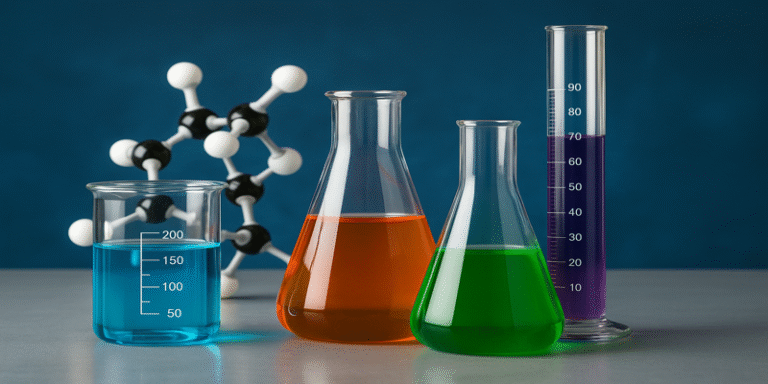Chemistry is often described as the central science, linking physics, biology, and environmental sciences. It offers a framework for understanding the composition, structure, properties, and changes of matter. The field is remarkably broad and dynamic, encompassing topics that stretch from the behaviour of individual atoms to complex biochemical reactions in living organisms. This article explores some of the key study modules within chemistry, illustrating how each contributes to our understanding of the material world and supports various technological, medical, and environmental advancements.
1.0 Organic Chemistry
Organic chemistry focuses on the structure, properties, composition, reactions, and synthesis of carbon-containing compounds. Since carbon can form stable covalent bonds with many elements, particularly hydrogen, oxygen, and nitrogen, this module is central to the study of life itself.
Organic chemistry is fundamental to numerous industries, including pharmaceuticals, petrochemicals, and agrochemicals. Students learn mechanisms of organic reactions, nomenclature, stereochemistry, and spectroscopic techniques used to characterise molecules. Key reactions, such as nucleophilic substitution and electrophilic addition, are core content.
According to Clayden et al. (2012), mastering organic chemistry requires recognising patterns in reactivity and applying these principles to predict outcomes. This makes the module both intellectually challenging and essential for innovation in drug discovery and materials science.
2.0 Inorganic Chemistry
In contrast to organic chemistry, inorganic chemistry deals with compounds not based on carbon-hydrogen bonding, including metals, minerals, and coordination complexes. The module introduces topics such as periodicity, transition metal chemistry, and crystal field theory.
Inorganic chemistry underpins advancements in catalysis, material design, and nanotechnology. It also explores the role of metal ions in biological systems and industrial processes. For example, understanding the redox behaviour of metals is crucial for designing electrochemical cells and batteries (Shriver & Atkins, 2014).
3.0 Physical Chemistry
Physical chemistry bridges chemistry and physics, focusing on the theoretical and quantitative aspects of chemical systems. It examines phenomena such as thermodynamics, kinetics, quantum mechanics, and spectroscopy.
This module enables students to understand why reactions occur, how fast they proceed, and how molecular structure influences physical properties. Mastery of the laws of thermodynamics and rate equations is critical to fields ranging from materials science to biophysical chemistry.
Atkins and de Paula (2018) argue that physical chemistry is the intellectual backbone of chemical science, providing the mathematical frameworks to describe and predict molecular behaviour.
4.0 Analytical Chemistry
Analytical chemistry is the science of identifying and quantifying matter. It plays a critical role in environmental monitoring, food safety, forensic science, and pharmaceutical development. The module covers techniques such as chromatography, mass spectrometry, titration, and UV-Vis spectroscopy.
Students learn how to assess chemical composition and purity, develop methods for sample preparation, and evaluate data for accuracy and reliability. Analytical skills are vital for regulatory compliance and quality assurance in chemical manufacturing (Harris, 2015).
With the growing demand for trace analysis and real-time monitoring, modern analytical chemistry increasingly incorporates instrumental methods and computational analysis.
5.0 Biochemistry
Biochemistry is the study of the chemical processes within and related to living organisms. It is a hybrid module that intersects with molecular biology and medicine. Students examine the structure and function of proteins, nucleic acids, carbohydrates, and lipids, as well as enzymatic reactions and metabolic pathways.
The biochemistry module is particularly important for students pursuing careers in biotechnology, pharmaceuticals, and medicine. According to Berg et al. (2019), biochemistry provides a mechanistic understanding of cellular function, which is critical for innovations in genetic engineering and therapeutics.
Topics like DNA replication, transcription, and signal transduction are vital for understanding both normal physiology and pathological conditions.
6.0 Environmental Chemistry
This module focuses on the chemical and biochemical phenomena that occur in nature. Environmental chemistry is critical for addressing global challenges such as climate change, pollution, and sustainable development.
Students explore the fate of chemical species in air, water, and soil, and learn how pollutants interact with ecosystems. Concepts such as green chemistry, atmospheric chemistry, and toxicology are central.
Manahan (2017) notes that environmental chemistry provides tools for assessing risk, developing eco-friendly processes, and implementing effective remediation strategies.
7.0 Industrial and Materials Chemistry
Industrial chemistry explores how chemical principles are applied in large-scale manufacturing, from polymer production to petroleum refining. The materials chemistry component delves into the design and synthesis of advanced materials like composites, nanomaterials, and smart materials.
Understanding reaction engineering, process optimisation, and catalysis is key to this module. According to Hocking (2016), this area is instrumental for innovation in aerospace, automotive, and electronics industries.
Students also examine structure-property relationships—how a material’s atomic structure influences its mechanical, thermal, or electrical behaviour.
8.0 Theoretical and Computational Chemistry
This increasingly important module uses mathematical models and computer simulations to predict and analyse molecular behaviour. Computational chemistry allows researchers to investigate systems that may be difficult or dangerous to study experimentally.
Using methods such as molecular dynamics, quantum chemical calculations, and density functional theory, students can simulate molecular interactions, predict properties, and explore reaction mechanisms (Cramer, 2013).
Theoretical chemistry provides deep insight into molecular orbital theory, symmetry, and the behaviour of matter at the atomic level—making it indispensable for drug design, materials discovery, and catalysis.
9.0 Laboratory and Research Skills
A core element across all chemistry modules is practical training. Students are taught essential laboratory techniques, safety protocols, and how to handle chemicals responsibly. They also learn to design experiments, record observations, and interpret data scientifically.
Capstone modules often include research projects, where students apply theory to investigate real-world chemical problems. According to RSC Education (2023), fostering hands-on competencies is essential for building critical thinking, problem-solving, and collaborative skills that are transferable to any scientific career.
Chemistry is far more than memorising the periodic table or balancing equations. It is a vast, interconnected discipline composed of numerous modules, each offering unique perspectives on the composition and transformation of matter. From biochemical reactions in cells to the quantum mechanical behaviour of atoms, chemistry enables us to decode the natural world and build solutions to global challenges.
Whether one’s interests lie in drug development, environmental sustainability, computational modelling, or industrial innovation, the study of chemistry offers a versatile and intellectually rich journey. Mastery of its key modules not only prepares students for scientific careers but also cultivates a mindset of curiosity, precision, and innovation.
References
Atkins, P. & de Paula, J. (2018). Physical Chemistry (11th ed.). Oxford University Press.
Berg, J.M., Tymoczko, J.L. & Gatto, G.J. (2019). Biochemistry (9th ed.). W.H. Freeman and Company.
Clayden, J., Greeves, N., Warren, S. & Wothers, P. (2012). Organic Chemistry. Oxford University Press.
Cramer, C. J. (2013). Essentials of Computational Chemistry: Theories and Models (2nd ed.). Wiley.
Harris, D.C. (2015). Quantitative Chemical Analysis (9th ed.). W.H. Freeman and Company.
Hocking, M. B. (2016). Handbook of Chemical Technology and Pollution Control (3rd ed.). Academic Press.
Manahan, S.E. (2017). Environmental Chemistry (10th ed.). CRC Press.
RSC Education. (2023). Teaching Chemistry Practical Skills: An Overview. Royal Society of Chemistry. Available at: https://edu.rsc.org/resources/practical-skills
Shriver, D.F. & Atkins, P.W. (2014). Inorganic Chemistry (5th ed.). Oxford University Press.









